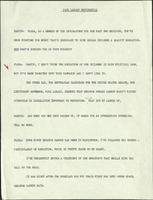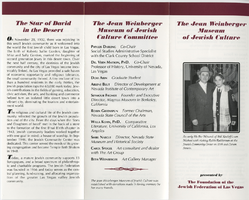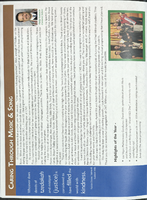Search the Special Collections and Archives Portal
Search Results

Transcript from "Five Minutes with Flora" regarding education funding, 1964
Date
Archival Collection
Description
Transcript of interview with Flora Dungan on the record of Senator Howard Cannon on education issues.
Text

Transcript of interview with Myra Berkovits by Barbara Tabach, August 21, 2014
Date
Archival Collection
Description
Interview with Myra Berkovits by Barbara Tabach on August 21, 2014. In this interview, Berkovits talks about growing up and starting her teaching career in Chicago. When she moves to Las Vegas, Berkovits eventually purchases a dining concierge business, but returned to teaching, and is now involved with the Sperling Kronberg Mack Holocaust Resource Center.
Myra Berkovits was born Myra Mosse in 1944 in Chicago, Illinois. She became an elementary school teacher in Chicago before moving to Las Vegas in 1980. Myra has made contributions to Las Vegas in the public and private sectors. She owned several businesses then returned to teaching, heading to the University of Nevada, Las Vegas (UNLV) to renew her teaching license and later received her master's degree. After a year of teaching in multicultural education, Myra was then in charge of the school district's homeless program, seeing its growth from serving 1,200 to 6,000 students. Myra's other passion was for Holocaust education and she became one of six interviewers in the city for the Shoah Foundation, documenting survivors' stories. One interviewee, David Berkovits, would later become her husband of fifteen years. Myra's own Holocaust education was aided by powerful trips to Israel and Poland. She used these experiences to develop and lead student-teacher conferences and classroom curriculum for the whole state. Myra still serves at the Education Specialist at the Holocaust Resource Center.
Text

Transcript of interview with Gary Sternberg by Barbara Tabach, February - April, 2015
Date
Archival Collection
Description
In this oral history, Gary explains how the family came to live in the United States?Cleveland and Los Angeles. In 1957, he married Noreen and they eventually came to live in Las Vegas where Gary worked for Sears selling washing machines, had a repair business and an importing business with Noreen. Gary was an entrepreneurial soul and inventive much like his father. He owns three patents.
On August 25, 1931, Augusta and Herman Sternberg welcomed their second child, Gerd (aka Gary), into the world of Cuxhaven, Germany. Augusta was a devout Christian of Polish ancestry who had fled Russian persecution. Herman was a German-born Jew salesman and inventor. The couple fell in love and had two children, Gary and Ruth who was a year and half older. By 1938, German politics were targeting Jews and Herman was ripped away from his Christian wife and children and sent to a concentration camp. Fate and friendship rescued Herman with the option to go to China. And so begins the history of the Sternberg family and how they all would eventually live together during World War II in the confines of a Jewish ghetto in Hongkew, China from May 1939 to July 1948. Gary had an extraordinary career as a dealer. He was not the stereotypical young dealer-to-be: he was in his 40s when he signed up for the Michael Gaughn Dealing School in the mid-1970s. Gary?s charming wit and ease of making friends soon gained him a position at El Cortez and then Caesars Palace. It was the same personality that would sustain his stellar thirty-one year career at Caesars. He was employed there from April 1974 until his retirement May 8, 2005. Though Jewish tradition would identify Gary as Christian, he self-identified as Jewish, officially converted and has been an active member of the Jewish community. Among his anecdotes-and he has many-is one about securing a $30,000 donation from Frank Sinatra and Jilly Rizzo for Congregation Ner Tamid.
Text
Audio clip from interview with Arne Rosencrantz by Barbara Tabach, February 18, 2015
Date
Archival Collection
Description
Part of an interview with Arne Rosencrantz on February 18, 2015. In this clip, Rosencrantz discusses his family heritage, childhood, and living in Las Vegas.
Sound

Jean Weinberger Museum of Jewish Culture pamphlet, 1996
Date
Archival Collection
Description
A pamphlet for the Jean Weinberger Museum, presented by The Foundation of the Jewish Federation of Las Vegas.
Text

Transcript of interview with Harry Sax by Barbara Tabach, April 8, 2015
Date
Archival Collection
Description
Interview with Harry Sax by Barbara Tabach on April 8, 2015. In this interview, Sax discusses his family history and upbringing in Chicago, and his military service in Munich. He returned to Chicago and became business partners with Michael Schulson, with whom he opened several Arby's outposts, and expanded to Las Vegas in 1968. He talks about life in Las Vegas in the 1970s and the competition in the fast food industry. He then talks about the reform congregation in Chicago and his connection to Judaism throughout his life. He describes himself as a "closet Jew" before becoming president at Congregation Ner Tamid in 2007. Sax discusses the programs at Ner Tamid for all ages, and his continued involvement in the community.
In 1939, Harry Sax was born in Chicago, Illinois, the son to first generation American Jews. He spent his childhood on Chicago's South, where his family belonged to a progressive Reform congregation. After graduating from Hyde Park High School, he continued his education at Indiana University. In college, Harry was a member of the ZBT Jewish fraternity, participated in a singing group, and was a cadet in the Reserve Officers' Training Corps. Upon graduating from college, Harry was stationed in Munich, Germany as a second lieutenant in the Quartermasters Corps. In addition to his required military duties, he also participated in an after-hours acting group; through this group, he was hired as an extra and for small roles, including The Great Escape. When he finished his service, Harry returned to Chicago, where he connected with a high school friend, Mike Schulson. The two became partners and purchased Arby's franchises in Chicago and Las Vegas. Thus, in 1968, while his partner remained in Chicago, Harry moved to Las Vegas and opened two franchise locations in two weeks. Though it took a few years to stabilize the business and overcome competition, he opened a third location in 1972 on South Decatur, what was then the western edge of the city. Today, Harry has nineteen locations in Las Vegas, with additional franchises in Reno and Barstow, California, and employs nearly 300 people. After about twenty years as a "closet Jew" in the city, Harry reconnected with Judaism and joined Congregation Ner Tamid in the late 1990s. He served on its board, eventually becoming vice president and then president (2007-09). He also dedicated himself to have a bar mitzvah, following up on his Jewish education and confirmation as a teenager. Harry has also served on the Anti-Defamation League's board as well as an active member of the Chamber of Commerce.
Text

Transcript of interview with Michael J. Shane by Barbara Tabach, October 26, 2016
Date
Archival Collection
Description
Michael Jay Shane is a natural musician and entertainer. Born in New York City in 1961, Shane is a graduate of the famous High School of Performing Arts, and later attend Peabody Conservatory of Music, before leaving to launch his musical entertainment career full-time. Shane has had a varied and full career ever since as a musical entertainer, working as emcee, comedian, voiceover actor, and musician, showcasing the piano, guitar, saxophone, clarinet as well as vocals. He moved to Las Vegas in 1995, and jobs have included playing the piano at Wynn?s Tower Suite Bar, Bootlegger, and currently, Italian American Club. In this interview, Shane shares about his family and a childhood filled with music. He discusses his career trajectory, and the influence Judaism has had in his upbringing and work. He details differences between working in New York City and Las Vegas, what makes Las Vegas unique for any musician or musical entertainer, and talks about changes in the local entertainment scene since corporations took over the gaming industry. He also shares stories about his career, including working with Jerry Lewis and following Andrew Dice Clay?s standup act.
Text

Transcript of interview with Mindy Unger-Wadkins by Barbara Tabach, October 28, 2015
Date
Archival Collection
Description
In this interview, Unger-Wadkins discusses growing up in Las Vegas? close-knit Jewish community in the 1960s and 1970s, and involvement with various Jewish youth organizations and activities. She also describes her career in public relations, reflecting upon the unique challenges faced when interacting with the public, and with politics, in her positions. Unger-Wadkins ends by describing her current work in land development, particularly the history of the Three Kids Mine and the technical and political process of ensuring the land is suitable as a residential area.
Text

Transcript of interview with Mike and Susan Baller by Barbara Tabach, March 16, 2016
Date
Archival Collection
Description
In this interview, Mike and Susan Baller reflect upon their lives in Las Vegas, from growing up as teenagers amongst the tight-knit Jewish community, to mob influence on the city, and the impact of the city's growth. Mike shares stories about first arriving in Las Vegas to live, being a teenaged busboy at Binions Horseshoe to being related to Moe Dalitz -- in Michigan Mike drove a truck for the Dalitz dry cleaning business.
Text

Annual report from Congregation Ner Tamid, 2008-2009
Date
Archival Collection
Description
Annual report from Congregation Ner Tamid, 2008-2009
Text
